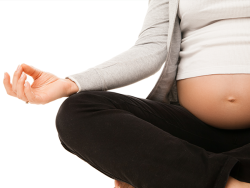Unmedicated Childbirth: Should I Be In the Hospital or At Home?
Sunny Gault: If you're thinking about having an unmedicated birth, you may have a lot of questions. And one of them may be well, where do I actually give birth? So I'm Sonny and with new mommy media and I am joined today by Hehe Stewart. She is the creator of The Birth Lounge and host of The Birth Lounge podcast. Hi, hey, thanks so much for being with us today.
Hehe Stewart: Hi, thanks for having me.
Sunny Gault: So Hehe let's talk about how moms can give birth safely if they want to go the unmedicated route. Let's first talk about a hospital. What are some of the pros and cons?
Hehe Stewart: Yeah, so I'm going to delivery in a hospital is going to depend highly on what hospital you choose. I think having this conversation with providers when you are early in your pregnancy about what are their typical labor's look like by the answers, you'll be able to tell if they primarily attend medicated deliveries or unmedicated deliveries. In the hospital. Obviously, there are various pros and cons to any place that you give birth in the hospital particularly you do have access to pain medication, should you decide to need it, you are typically around highly trained medical professionals and the other facilities that come along with that. So Nick use and having higher medications and higher trained professionals around you some cons about being in the hospital, you're generally more comfortable at your home, right? Um, typically you have people in and out of your room because of shift change, you're not going to find that at home birth, it's going to be your same attendance all the way through. And then of course, we do have that heightened risk of just simply being in the hospital that comes along with anytime you enter the hospital.
Sunny Gault: Okay, do you see moms being a little bit more leery of going into hospitals now due to the kind of environment we're in nowadays with the pandemic? Do you see more people kind of trying to steer clear of that, though? Is there more concerned you get moms asking you those kinds of questions?
Hehe Stewart: Absolutely. Now, we want to keep in mind that our hospitals have done extensive protocols to keep people safe. And it is safe to give birth in the hospital in COVID. But we did see a spike in home birth because of exactly what you're saying. People began to be a little bit weary of going into the hospital and intentionally putting themselves in a place where they know COVID positive people are and homebirth began to be explored.
Sunny Gault: Yeah, okay, so that's a good transition. Let's talk a little bit about home birth, and what moms should consider if they're planning to give birth at home.
Hehe Stewart: Sure. So I think we need to back up just a little bit and talk about the trends in home birth, before we dive into whether that's a good decision for you. So home birth has always been in our country, the US right, about less than 1% of births happen in home births. And in the early 90s, we really started to see that number decline, known between 2004 in 2017, we saw that number almost double it went from about 35,000 to 62,000. In the year of 2017. The biggest problem that we find with homebirth is the roadblock of payer payee situation. Many insurances do not cover home birth. And so it then falls on the shoulders of the birth or in their families to cover that cost. It's an out of pocket costs, many times possibles and home, hospitals and birth centers are going to be covered in your insurance. And so that plays a role.
When it comes to thinking about home birth, you want to think about a couple of things. Do you have a qualified birth attendant? So a midwife in your area? Someone who is a certified nurse midwife who can attend your labor? Does that person have a relationship with the surrounding hospital? How close are you to a hospital? Should you need any additional advanced medical support? There are various questions that you're going to want to ask the providers that are around you. And of course, look into your community to see if there are birth attendants out of hospital birth attendants that can come to your birth, it's important to recognize that a con, the American College of Obstetrics and Gynecology does say that home birth is an option for women, but they do urge you to look into making sure that you have a birth attendant that's qualified making sure that you are near a hospital, the same things that we just talked about.
Sunny Gault: Yeah, and I think one of the things you have to consider too, is even though you plan for a home birth, hopefully you end up giving birth at home, but there are a lot of transfers when it happened to so you almost kind of have to when you're considering a home birth, you still kind of have to do some of the research to know what else is out there. Like you said, should you need to transfer to a hospital should things escalate and you know, things happen that you can't possibly know or control.
Hehe Stewart: Absolutely. And so many most transfers from home births are not actually emergent. They are for medical pain relief, most people ought to get an epidural and they've reached kind of the end of their rope at home. And so that's where we see most of our transfers come in. In that case, you typically get to choose which hospital you go to and so knowing which hospitals are around your home, and what pain relief they have available, what is their philosophy on birth, you know, What do other people in your community have to say about their experience at that hospital? That's where that comes in. If you need to transfer, you're going to want to have a say in where you go. Okay?
Sunny Gault: Now, I also want to talk a little bit about water and how water can really help in an unmedicated birth situation. And I feel like this is yes, it's dealing with home birth, because obviously you have more control. And then also probably birthing centers. I don't know a lot of hospitals that are actually doing the water births. Do you know is? Is that kind of still how it is? At least it was when I was having my babies or has that changed?
Hehe Stewart: No, it hasn't really changed only because the American College of Obstetrics and Gynecology does not support waterbirth. Now they do support hydrotherapy, which is very different. laboring in water has immense benefits, such as relaxation, and being able to get rest, lowering your anxiety, pain relief, and then it lowers your necessity for medical pain relief. So it actually helps people have and achieve that unmedicated delivery, if that's what you choose. So hydrotherapy is supported in hospitals, and many hospitals do have Tubs and Showers but actually birthing in the water. So a water birth is going to be primarily out of bird centers, some birth centers do not allow them, and then home births. Okay,
Sunny Gault: Alright. So in the hospital setting, then you could basically just labor in water, or like you said, it's kind of like taking a shower that always feels good, does that if you're pregnant or not, right, just the warm water, but then you would actually have to get out like they want you to actually push or whatever you're doing outside of the water. That's the big difference here.
Hehe Stewart: True. So a cog calls it on land. And so they just really want you to be on dry land. A lot of times, you're gonna see hospital providers really try and maybe get you to the bed. It's important to know you don't have to get on the bed to have your baby you can squat, kneel, do hands and knees. The bed is a tool at your disposal to use but not not a necessity.
Sunny Gault: Okay, so if you're actually giving birth in the water, though, how can that help? What What have you seen?
Hehe Stewart: Yeah, so I'm the same things that hydrotherapy does. But we prevent that disruption of having to turn off the water and get you out of the tub. So you're already relaxed, we're gonna let you have your baby, relax, you already have lower anxiety, turning off the water and asking you to get out would probably defeat the purpose by raising your anxiety, we're just gonna leave you the and then it is important to know that your baby's not going to take their first breath until their face touches the air. So there are videos out there you can you can search and see that when you're born into the water, your baby kind of hangs out because it's a gentler transition because they go from water in the amniotic sac to water in the waterbird setting, and then you ease them up.
Sunny Gault: Yeah, I think sometimes we forget that we're like, once the baby comes out, they have to breathe and then you know, I mean, they aren't gonna have to breathe but like we forget that they're in liquid. Right, the amniotic fluid for like nine months, and then that's a very natural transition. I have seen some of those videos, you're talking about what almost looks like they're just swimming. And I know sometimes that freaks people out, but like, that's what they were in. That's what we were all in. Right. So it's interesting. Okay, awesome. Thank you, Hehe appreciate all the information. If you would like to learn more about Hehe, as well as her services, her podcast that she's got going on, you can visit thebirthlounge.com Also, be sure to check out our website newmommymedia.com- where real moms talk about real life.






